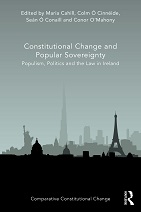Edited By Maria Cahill, Colm Ó Cinnéide, Seán Ó Conaill, Conor O’Mahony (Routledge 2021, 328 pages)
About the book
This collection focuses on the particular nexus of popular sovereignty and constitutional change, and the implications of the recent surge in populism for systems where constitutional change is directly decided upon by the people via referendum.
It examines different conceptions of sovereignty as expressed in constitutional theory and case law, including an in-depth exploration the manner in which the concept of popular sovereignty finds expression both in constitutional provisions on referendums and in court decisions concerning referendum processes. While comparative references is made to a number of jurisdictions, the primary focus of the collection is on the experience in Ireland, which has a lengthy experience of referendums on constitutional change and of legal, political and cultural practices that have emerged in association with these referendums. At a time when populist pressures on constitutional change are to the fore in many countries, this detailed examination of where the Irish experience sits in a comparative context has an important contribution to make to debates in law and political science.
At a time when populist pressures on constitutional change are to the fore in many countries, this detailed examination of where the Irish experience sits in a comparative context has an important contribution to make to debates in law and political science.
About the series
Comparative Constitutional Change has developed into a distinct field of constitutional law. It encompasses the study of constitutions through the way they change and covers a wide scope of topics and methodologies. Books in this series include work on developments in the functions of the constitution, the organization of powers and the protection of rights, as well as research that focuses on formal amendment rules and the relation between constituent and constituted power. The series includes comparative approaches along with books that focus on single jurisdictions, and brings together research monographs and edited collections which allow the expression of different schools of thought. While the focus is primarily on law, where relevant the series may also include political science, historical, philosophical and empirical approaches that explore constitutional change.
